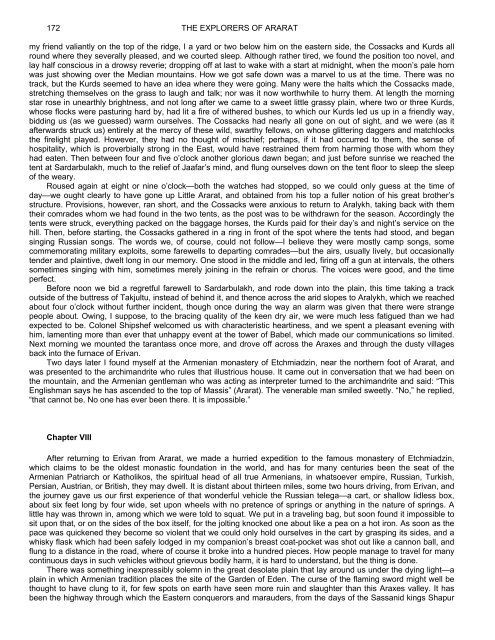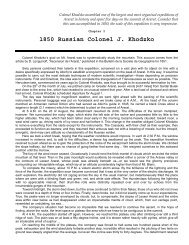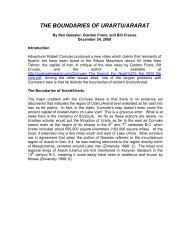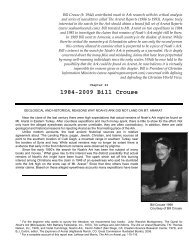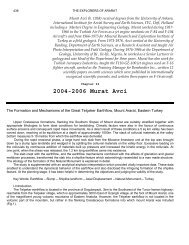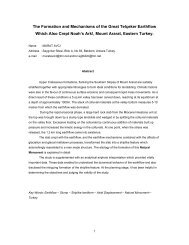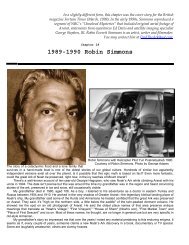1876 British Viscount & Ambassador James Bryce - Noah's Ark Search
1876 British Viscount & Ambassador James Bryce - Noah's Ark Search
1876 British Viscount & Ambassador James Bryce - Noah's Ark Search
You also want an ePaper? Increase the reach of your titles
YUMPU automatically turns print PDFs into web optimized ePapers that Google loves.
172 THE EXPLORERS OF ARARAT<br />
my friend valiantly on the top of the ridge, I a yard or two below him on the eastern side, the Cossacks and Kurds all<br />
round where they severally pleased, and we courted sleep. Although rather tired, we found the position too novel, and<br />
lay half conscious in a drowsy reverie; dropping off at last to wake with a start at midnight, when the moon’s pale horn<br />
was just showing over the Median mountains. How we got safe down was a marvel to us at the time. There was no<br />
track, but the Kurds seemed to have an idea where they were going. Many were the halts which the Cossacks made,<br />
stretching themselves on the grass to laugh and talk; nor was it now worthwhile to hurry them. At length the morning<br />
star rose in unearthly brightness, and not long after we came to a sweet little grassy plain, where two or three Kurds,<br />
whose flocks were pasturing hard by, had lit a fire of withered bushes, to which our Kurds led us up in a friendly way,<br />
bidding us (as we guessed) warm ourselves. The Cossacks had nearly all gone on out of sight, and we were (as it<br />
afterwards struck us) entirely at the mercy of these wild, swarthy fellows, on whose glittering daggers and matchlocks<br />
the firelight played. However, they had no thought of mischief; perhaps, if it had occurred to them, the sense of<br />
hospitality, which is proverbially strong in the East, would have restrained them from harming those with whom they<br />
had eaten. Then between four and five o’clock another glorious dawn began; and just before sunrise we reached the<br />
tent at Sardarbulakh, much to the relief of Jaafar’s mind, and flung ourselves down on the tent floor to sleep the sleep<br />
of the weary.<br />
Roused again at eight or nine o’clock—both the watches had stopped, so we could only guess at the time of<br />
day—we ought clearly to have gone up Little Ararat, and obtained from his top a fuller notion of his great brother’s<br />
structure. Provisions, however, ran short, and the Cossacks were anxious to return to Aralykh, taking back with them<br />
their comrades whom we had found in the two tents, as the post was to be withdrawn for the season. Accordingly the<br />
tents were struck, everything packed on the baggage horses, the Kurds paid for their day’s and night’s service on the<br />
hill. Then, before starting, the Cossacks gathered in a ring in front of the spot where the tents had stood, and began<br />
singing Russian songs. The words we, of course, could not follow—I believe they were mostly camp songs, some<br />
commemorating military exploits, some farewells to departing comrades—but the airs, usually lively, but occasionally<br />
tender and plaintive, dwelt long in our memory. One stood in the middle and led, firing off a gun at intervals, the others<br />
sometimes singing with him, sometimes merely joining in the refrain or chorus. The voices were good, and the time<br />
perfect.<br />
Before noon we bid a regretful farewell to Sardarbulakh, and rode down into the plain, this time taking a track<br />
outside of the buttress of Takjultu, instead of behind it, and thence across the arid slopes to Aralykh, which we reached<br />
about four o’clock without further incident, though once during the way an alarm was given that there were strange<br />
people about. Owing, I suppose, to the bracing quality of the keen dry air, we were much less fatigued than we had<br />
expected to be. Colonel Shipshef welcomed us with characteristic heartiness, and we spent a pleasant evening with<br />
him, lamenting more than ever that unhappy event at the tower of Babel, which made our communications so limited.<br />
Next morning we mounted the tarantass once more, and drove off across the Araxes and through the dusty villages<br />
back into the furnace of Erivan.<br />
Two days later I found myself at the Armenian monastery of Etchmiadzin, near the northern foot of Ararat, and<br />
was presented to the archimandrite who rules that illustrious house. It came out in conversation that we had been on<br />
the mountain, and the Armenian gentleman who was acting as interpreter turned to the archimandrite and said: “This<br />
Englishman says he has ascended to the top of Massis” (Ararat). The venerable man smiled sweetly. “No,” he replied,<br />
“that cannot be. No one has ever been there. It is impossible.”<br />
Chapter VIII<br />
After returning to Erivan from Ararat, we made a hurried expedition to the famous monastery of Etchmiadzin,<br />
which claims to be the oldest monastic foundation in the world, and has for many centuries been the seat of the<br />
Armenian Patriarch or Katholikos, the spiritual head of all true Armenians, in whatsoever empire, Russian, Turkish,<br />
Persian, Austrian, or <strong>British</strong>, they may dwell. It is distant about thirteen miles, some two hours driving, from Erivan, and<br />
the journey gave us our first experience of that wonderful vehicle the Russian telega—a cart, or shallow lidless box,<br />
about six feet long by four wide, set upon wheels with no pretence of springs or anything in the nature of springs. A<br />
little hay was thrown in, among which we were told to squat. We put in a traveling bag, but soon found it impossible to<br />
sit upon that, or on the sides of the box itself, for the jolting knocked one about like a pea on a hot iron. As soon as the<br />
pace was quickened they become so violent that we could only hold ourselves in the cart by grasping its sides, and a<br />
whisky flask which had been safely lodged in my companion’s breast coat-pocket was shot out like a cannon ball, and<br />
flung to a distance in the road, where of course it broke into a hundred pieces. How people manage to travel for many<br />
continuous days in such vehicles without grievous bodily harm, it is hard to understand, but the thing is done.<br />
There was something inexpressibly solemn in the great desolate plain that lay around us under the dying light—a<br />
plain in which Armenian tradition places the site of the Garden of Eden. The curse of the flaming sword might well be<br />
thought to have clung to it, for few spots on earth have seen more ruin and slaughter than this Araxes valley. It has<br />
been the highway through which the Eastern conquerors and marauders, from the days of the Sassanid kings Shapur


